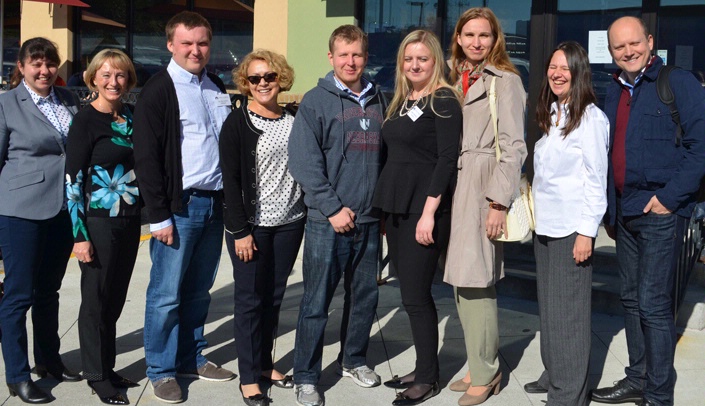In November, UNMC once again took part in the Open World Program, a federal program that strives to stimulate goodwill and collaboration between the people of Russia and the United States.
The visiting doctors were all research scientists in molecular diagnostics of HIV/AIDS, and/or resistant infections including staphylococcus and tuberculosis.
“We’ve found over the years that governments disagree a lot, but the people seem to be very good wherever they come from,” said Mike Mendlick, M.D., a member of Friendship Force of Greater Omaha, which hosts the visiting scientists. “We have a people-to-people relationship that’s fun.”
Dr. Mendlick, who is a retired faculty member from the UNMC Department of Orthopaedic Surgery, said that members of Friendship Force were proud to show off Nebraska and UNMC to the Russian visitors. That included meetings with Michael Dixon, Ph.D., president and CEO of UNeMed, Howard Gendelman, M.D., chair of the department of pharmacology and experimental neuroscience, and Courtney Fletcher, Pharm.D., dean of the College of Pharmacy; a tour of the Nebraska Biocontainment Unit with Mark Rupp, M.D., chief of the division of infectious diseases; an off-campus meeting with Adi Pour, Ph.D., director of the Douglas County Health Department; a tour of the governor’s mansion; and many other activities.
Maksim Kupyushkin, Ph.D., one of the visiting scientists, said it was a pleasure to visit Omaha.
“I didn’t know too much about Nebraska before,” he said, adding that it was interesting to see how much effort the state government had put into creating a state-of-the-art campus in terms of both science and the physical buildings.
“It was great to observe the public-private partnership,” added Alexander Khilkov, the facilitator for the Russian group. “The government provides the basis, and then private donors and manufacturers of the university play a significant role.”
Dr. Kupyushkin was especially interested in UNeMed, the university’s transfer technology office, something he has been trying to push through at his university in Russia, as well.
“I try to find financial support for our projects,” he said. “Here it’s the opposite story — they go around the university and try to find investigators and help them to commercialize their investigations.”
The Russian scientists were all “Nelson Fellows.” In 2013, the board of trustees of the Open World Leadership Center voted to create a program of Sen. Ben Nelson Fellows to honor Sen. Nelson’s contribution to Open World and to improving ties between the U.S. and countries of the former Soviet Union.

Great job done by Mike.